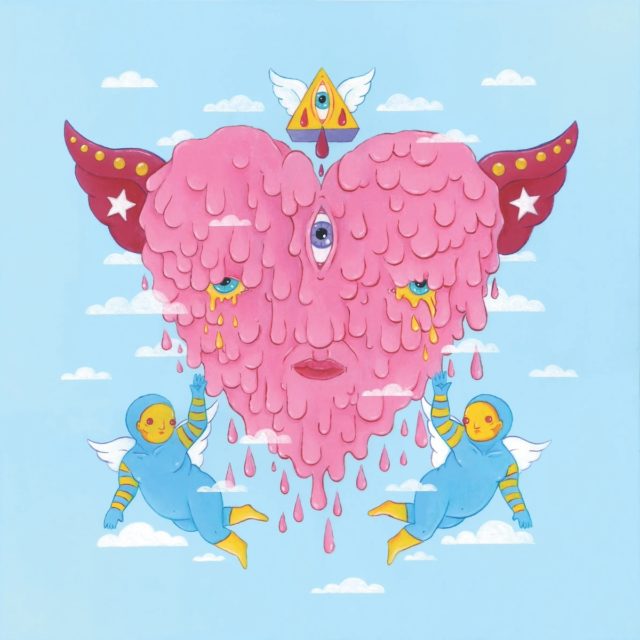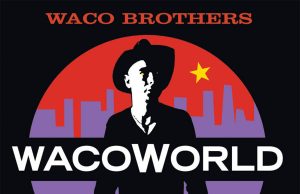THE EDITED PRESS RELEASE: “Mondo Cozmo — the enigmatic musical force who commands notoriety with critically acclaimed albums like Plastic Soul — returns with It’s PRINCIPLE!, a varied, grizzled, intense, sincere, and intricate rock album produced by Mark Rankin (Queens of the Stone Age).
Cozmo, also known as Josh Ostrander, began his career as part of bands Laguardia and Eastern Conference Champions. The latter experienced a degree of success, with a song featured on the Twilight soundtrack. But that wasn’t enough for the Philadelphia native. Soon, the band split and Ostrander began recording under the moniker Mondo Cozmo. Now on his own, he did everything it took to survive in order for him to make his music successful. He slept on sofas, cut costs when possible. Like all good things, success came after many years of hard work.
Cozmo has released a series of acclaimed albums, including the critics darling Plastic Soul, which landed him a No. 1 single in Shine and helped him find fans from Butch Vig to Bruce Springsteen, who praised his songwriting in a New York Times article. He has landed and lost major-label deals, and opened for pretty much every band in America. He has forged an independent path, releasing more critically acclaimed albums, and punched a glass window in a fit of frustration and nearly ended his career.

Various speed bumps like this spurred a transformative journey for Cozmo. A brief stint opening for indie-rock vets Spoon on tour, and witnessing their remarkable mid-career reinvention, also helped him decide to follow suit. “I was lucky enough to tour with Spoon before they went in and recorded Lucifer On The Sofa,” Cozmo says. “I believe I witnessed a reinvention with the band that I found stunning. From artwork to production to internal decisions, I knew what I needed to do and I used it as a hand guide for It’s PRINCIPLE! I’ll forever be thankful to Spoon.”
Cozmo took bold steps, parting ways with his manager of 15 years and immersing himself in the world of acclaimed producers and engineers. Thanks to the power of social media, he connected with Rankin, who zapped files back and forth before heading to Cozmo’s studio near Lake Arrowhead.
As Cozmo/Ostrander wrote the songs for the album, the impending death of his dog Cozmo weighed heavily on him and served as inspiration. As he felt Cozmo’s time slipping away, Ostrander spent more time with him, including bringing him to studio during the sessions. Much of the album’s lyrical matter addressed the impending death and the emotions he was going through.
Throughout the process, Cozmo was conscious that he needed to make a concise record that was focused, but he had an unprecedented creative spark. He wrote 70 songs. The grimy, rocking title track is brazen in sound but sincere in their message — and began as a song built around the lyric, “So I’m slashing tires on Main Street America.” Its arguably the best song on the album, but nearly didn’t make the cut. After sending it to Rankin, he had sender’s remorse. He nearly deleted the song before Rankin responded to tell him that the song should lead off the album.

Fueled by a newfound confidence and determination from positive collaborations with industry giants, the album has a cocksure bluster of an artist that has run out of f**ks to give, and all the better for it. Killing Floor is a brawny epic, previously released single, Angels is a wall-of-sound rock epic with momental lyrics. Sundown In An Age Of Fear is more abstract but contains a refined energy, hard to pinpoint but compelling to its core.
In the end, Mondo Cozmo’s fourth studio album is his most complete and vulnerable body of work. Instead of an ending, it marks a new beginning. Not many artists are fortunate to successfully hit the reset button. Yet, that’s exactly what It’s PRINCIPLE is: The work of an artist who has been through it, taking a big swing and connecting with an album that he made for himself — but it would be nice if others like it too.
Cozmo concludes, “I guess I made this record for myself. I mean I didn’t play any demos for anyone who absolutely didn’t need to be involved. And I actually don’t care if anyone likes it. I mean it’s glorious when they do but I think as a defense mechanism I believe I have created this wall to guard the creative spirit. Maybe that’s what Rick Rubin was actually talking about when he said ‘make music for yourself.’ ”








































